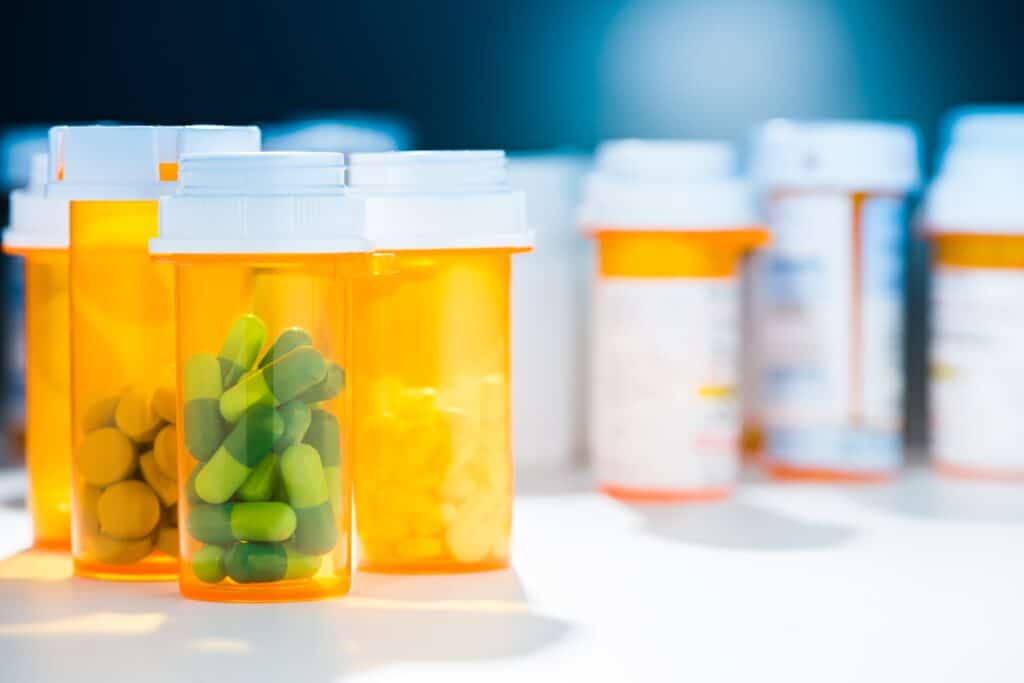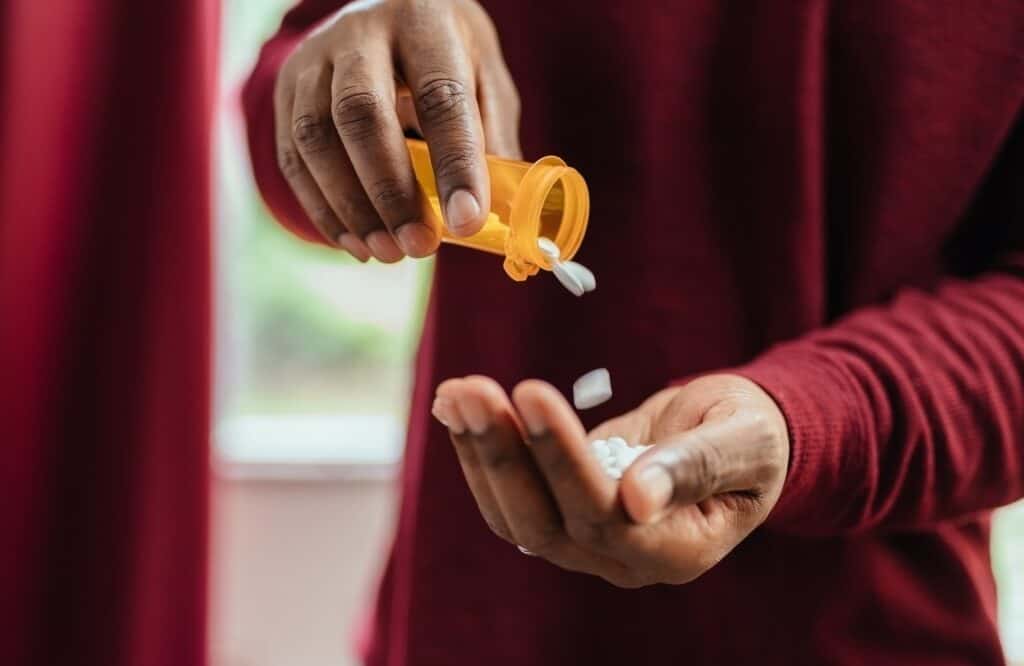Prescription Drug Rehab In Lexington, KY
Prescription drug addiction is a growing problem in the United States. For those struggling with prescription drug addiction, help is available. Lexington Addiction Center provides comprehensive treatment options for prescription drug rehab in Lexington, KY. Our experienced staff offers evidence-based therapies, medication management, relapse prevention education, and dual diagnosis to give individuals the best chance of recovery success. With our individualized approach and compassionate care, we are committed to helping people get back on track toward a better life free from addiction.
Prescription Drugs and Addiction
Humans have abused substances for centuries. But it was not until the 1950s that psychotherapeutic drugs were introduced. People of all ages, races, and socioeconomic backgrounds are prone to misusing prescription drugs, such as Valium® (diazepam). This medication has been one of the most commonly prescribed drugs around the world since its initial market launch in 1963.
When someone takes a prescription medicine in an unintended way or dose, it is referred to as prescription drug misuse. Typically, this includes taking someone else’s medicine, taking more than what is prescribed, and using it to get high or in a different manner than what was scripted (such as crushing and snorting or injecting). In some cases, an addiction develops from misuse of these medications.
Statistics show there has been a significant increase in prescription drug misuse over the past two decades. This is evidenced by increased treatment admissions due to prescription drug use disorders and overdose deaths caused by these substances. Both of these experienced an initial rise before stabilizing throughout 2020. Additionally, results from the 2021 National Survey on Drug Use and Health (NSDUH), show that among people aged 12 or older, 5.1 percent (or 14.3 million people) misused prescription psychotherapeutic drugs in the past year.
Ultimately, medical professionals must consider all possible risks when prescribing psychotherapeutic medications. Furthermore, patients should be aware that taking them improperly could lead to serious health problems, addiction, overdose, and even death. They should discuss the potential dangers and side effects of these medications with their healthcare provider. Also, patients should dispose of unused medications properly.


Contact Us
Set yourself free from the struggles of addiction and co-occurring mental health disorders. Reach out to our treatment team in Lexington, Kentucky today.
Commonly Abused Prescription Drugs
Drugs that interfere with the natural communication between neurons can cause a variety of harmful effects. These range from decreased coordination to depression to death. Commonly abused prescription drugs activate the brain’s reward center, which can lead to physical dependence and addiction.
Physical dependence means that an individual may require higher doses of a drug to get the same effect. Also, they may experience withdrawal symptoms if the drug is discontinued. Addiction is more than just physical dependence, however. It also includes compulsive behavior and substance use even when it has negative consequences in one’s life.
Drugs can produce pleasure or euphoria when taken due to surges of chemical signaling compounds. Including opioids (endorphins) and other neurotransmitters in parts of the basal ganglia (the reward circuit). While dopamine was once thought to be directly responsible for this high feeling, scientists now believe it is primarily involved in reinforcement rather than producing pleasure itself.
Drug use that results in these large surges of neurotransmitters can become habit-forming and lead to further addiction over time. The long-term misuse of prescription drugs can cause serious changes in the brain that can be difficult to reverse. When someone misuses drugs, their brain adjusts by decreasing the production of neurotransmitters that send signals to reward pathways. And also reducing the number of receptors that can receive those signals.
As a result, they become less able to experience pleasure from healthy activities like exercise, eating, spending time with family, or engaging in hobbies. This effect on the brain is why many people find it so hard to break free from addiction without professional help. The prescription drugs most often misused include opioid painkillers, anti-anxiety medicines, sedatives, and stimulants.
Central Nervous System (CNS) Depressants
People addicted to CNS depressants, such as tranquilizers, sedatives, and hypnotics, should not attempt to quit on their own. Common abused CNS depressants include:
- Barbiturates
- Benzodiazepines
- Sleep medications
Withdrawal symptoms associated with these medications may be severe and even life-threatening in certain cases. Therefore, those who are dependent on CNS depressants should always seek out medical intervention to ensure a safe and successful detoxification process. This process involves gradually tapering off the dosage of the drugs until complete abstinence is achieved.
In addition to detoxification, counseling is also an important component of treatment for addiction to CNS depressants. Cognitive-behavioral therapy (CBT) has been proven effective in helping individuals cope with discontinuing benzodiazepines. CBT focuses on modifying one’s thinking patterns, expectations, and behaviors while equipping them with the skills necessary for managing various stressors they may encounter in everyday life.
It is also important to note that many people misuse CNS depressants in conjunction with other substances like alcohol or opioids. When this polydrug use is present, comprehensive treatment must be sought that can address all aspects of addiction simultaneously. At our prescription drug rehab in Lexington KY, individuals can access the specific services needed to successfully treat their addiction from both a traditional and holistic standpoint.
Opioids and Morphine Derivatives
Opioids are a class of drugs that act on the nervous system to reduce the perception of pain. They work by attaching to and activating opioid receptor proteins that are found in the brain, spinal cord, gastrointestinal tract, and other organs throughout the body. When opioids bind to these receptors, they effectively block pain signals from reaching the brain.
Additionally, they can cause feelings of euphoria when taken at higher-than-prescribed doses or in other ways than intended. Commonly prescribed opioid medications are used to treat moderate to severe pain through a slow, steady release of the drug into the bloodstream. Unfortunately, these medications have been abused. Consequently, people have been known to snort or inject them for a more intense high. This practice carries immense risk as it can lead to serious medical complications including overdose. Even with just one large dose.
When taken as prescribed by a doctor, opioids safely and effectively manage pain symptoms. However, regular or longer-term use of these medications can result in tolerance and dependence. People who misuse prescription opioids may also be at an increased risk for transitioning to heroin use. Commonly prescribed opioids include:
- Codeine
- Morphine
- Methadone
- Fentanyl and analogs
- Other Opioid Pain Relievers:
- Oxycodone HCL
- Hydrocodone Bitartrate Hydromorphone
- Oxymorphone
- Meperidine
- Propoxyphene
Stimulants
Prescription stimulants, such as dextroamphetamine and methylphenidate, work on the family of monoamine neurotransmitter systems in the brain that includes norepinephrine and dopamine. Stimulants boost the effects of these chemicals, resulting in increased dopamine signaling which leads to a sense of euphoria. These medications also affect norepinephrine levels, raising blood pressure, heart rate, and blood glucose levels, as well as opening up airways. Prescription stimulants that are commonly misused include:
- Amphetamines
- Methylphenidate
Individuals become dependent or addicted to prescription stimulants just as with other drugs in the stimulant category like cocaine. Discontinuing the use of stimulants may bring about withdrawal symptoms such as fatigue, depression, or sleep problems. Repeated misuse can cause hostility, paranoia, or even psychosis in extreme cases. Taking too much of a stimulant can be dangerous and may lead to dangerously high temperatures, irregular heartbeat, or cardiac arrest.
The surge in prescriptions for stimulant medications over the past two decades has made them more accessible. Thus, an increased potential for diversion and abuse. These drugs are extremely beneficial when taken correctly to treat specific conditions. However, they are frequently misused due to misconceptions surrounding their safety and efficacy.

Signs and Symptoms of Prescription Drug Addiction
Research suggests that certain personal characteristics increase the likelihood of prescription drug abuse. Environmental influences, peer pressure, age, genetics, psychological issues, and lack of awareness about the dangers of these drugs are all considered important risk factors for addiction. Symptoms of prescription drug dependency vary depending on numerous factors.
However, there are common signs and behaviors shared by all types of substance use disorders such as:
- Increased secrecy
- Isolation from friends and family
- Changes in sleeping habits or diet
- A marked decline in performance at work/school/home
- Inability to manage responsibilities or prioritize tasks
- Financial problems due to spending money on drugs
- Legal trouble related to drug use
- Taking risks such as driving under the influence of drugs
- Loss of interest in hobbies and activities previously enjoyed
In addition to these behavioral clues, physical symptoms like weight loss or gain, bloodshot eyes, poor hygiene, lethargy, trembling hands, heavy perspiration, shallow breathing, and an overall anxious demeanor may also be indicators of a problem with substance use.
If someone is struggling with prescription drug abuse, professional help is available to guide them through the recovery process. Seeking out a program that specializes in treating addiction to prescription medications is essential for success.

Prescription Drug Addiction Treatment
Treating prescription drug addiction requires a tailored approach that takes into account the type of drug being used, individual needs, and any co-occurring mental health disorders. Treatment may include counseling, withdrawal management, medication-assisted treatment (MAT), and recovery support. Counseling helps individuals work through their struggles while learning the skills needed to resist cravings and abstain from further drug use.
Depending on the prescription drug used and the extent of usage, detoxification may be necessary before other treatments begin. For instance, withdrawal from opiates may involve gradually decreasing the dosage until it is no longer being used. Or taking addiction medicines like clonidine (Catapres) with other medications to manage opioid withdrawal symptoms.
Withdrawal from anti-anxiety medications or sedatives may take weeks to taper off due to their long-term usage. Alternatively, mood stabilizers may be prescribed to manage withdrawal symptoms during tapering. There are currently no FDA-approved drugs for stimulant withdrawal treatment. However, tapering off such drugs along with addressing associated sleep problems, tiredness, and depression is typically recommended.
Accessing professional help for prescription drug abuse can be daunting and asking for support from family or friends may come with feelings of embarrassment or fear of judgment. However, seeking out resources from healthcare providers, self-help groups such as 12-step programs, faith groups, school counselors/nurses, peer support groups (in person or online), or employee assistance programs is essential in overcoming this difficult disorder. Reaching out for help can open many doors into recovery pathways. Consequently, leading to a fulfilling life free from addiction.
Prescription Drug Withdrawal
Opioids/Opiates
Opioid withdrawal can be a difficult process. As such, it’s important to undergo this procedure with the guidance of a healthcare professional. Tapering is the most common approach for safely reducing opioid use. This involves slowly decreasing the dosage of medication until none is used. To supplement tapering, other medications such as clonidine (Catapres) may be prescribed to help manage opioid withdrawal symptoms.
Withdrawal symptoms may include:
- Muscle aches
- Restlessness, agitation
- Anxiety, depression
- Runny nose and eyes tearing
- Excessive sweating
- Insomnia
- Nausea, vomiting, diarrhea, abdominal cramping
- Dilated pupils and blurry vision
- Rapid heart rate and high blood pressure
In the United States, healthcare providers can legally prescribe buprenorphine, buprenorphine-naloxone (Suboxone), or methadone under certain monitored conditions. These medications ease the effects of withdrawal from opioid painkillers. Additionally, healthcare professionals offer some drugs by injection once a month that help individuals stay off opioids during their recovery. For example, naltrexone (Vivitrol) and buprenorphine (Sublocade).
CNS Depressants
Someone withdrawing from anti-anxiety medicines and sedatives is another arduous task that should also only be done under the supervision of a healthcare provider. Individuals can safely reduce the amount of medicine taken over time by gradually tapering down doses. This process often takes several weeks due to potential withdrawal symptoms such as sleep problems, tiredness, and depression. Furthermore, other types of medicine may be prescribed to help make moods more stable while aiding in the final stages of tapering and managing anxiety levels.
In addition to a rebound of symptoms the drug was originally prescribed to treat, withdrawal symptoms of depressants may include:
- Seizures
- Shakiness
- Anxiety
- Agitation
- Insomnia
- Overactive reflexes
- Increased heart rate, blood pressure
- Increased body temperature with sweating
- Hallucinations
- Severe cravings
Stimulants
Although there is no FDA-approved drug specifically for stimulant withdrawal treatment, methods such as tapering and symptom relief are usually employed. This includes reducing dosages accordingly while offering support for any associated issues such as sleep problems or depression. Regardless of which substance is someone detoxing from, it’s important to seek appropriate medical assistance during this difficult process.
Stimulant withdrawal symptoms may include:
- Fatigue
- Agitation and irritability
- Unpleasant dreams
- Inability to sleep or sleeping excessively
- Increase in appetite
- Dehydration
- Depression with suicidal thoughts
- Chills
- Cravings
- Anxiety
- Impaired memory
- Dulled senses
Benefits of Our Prescription Drug Rehab in Lexington, KY
At Lexington Addiction Center, we strive to provide a comprehensive and tailored approach to recovery for those struggling with substance abuse and mental health disorders. Our team of experienced professionals provides personalized support through an extensive range of outpatient treatment programs.
Thus, allowing clients to receive the care they need without having to completely leave their current lives. With this flexible model of care, clients can step down into lower levels of care as their recovery progresses. Or choose to start at the most appropriate level for them depending on their needs.
The recovery process is highly individualized and our team takes it upon themselves to assess each client’s unique situation. As a result, they create an effective plan for long-term sobriety. This includes learning healthy coping skills which will assist the person in managing both addiction and mental health symptoms.
Through these outpatient programs, clients also benefit from increased feelings of community and belonging amongst peers who are going through similar experiences. Moreover, improved relationships with loved ones due to the interpersonal skills they learn during treatment. Furthermore, our programs focus on teaching clients healthy lifestyle choices.
Such as proper nutrition, exercise, and better sleep habits. All of which have positive effects on both physical and mental health. It is our goal at the Lexington Addiction Center that each client can emerge from treatment feeling more informed about themselves and empowered with the skills necessary for long-term success in sobriety.
Our comprehensive outpatient programs include:
Prescription Drug Rehab at Lexington Addiction Center
If you or someone you know is struggling with a prescription drug addiction, help is available. Our prescription drug rehab in Lexington provides personalized care and support throughout the recovery process. Comprehensive treatment plans may include medication management and dual-diagnosis treatment combined with talk therapy and other evidence-based practices. Thereby, helping clients achieve long-term recovery and improved quality of life.
Contact us today to learn more about compassionate and confidential prescription drug rehab in Lexington, KY.
What We Treat
Contact Us
Set yourself free from the struggles of addiction and co-occurring mental health disorders. Reach out to our treatment team in Lexington, Kentucky today.
